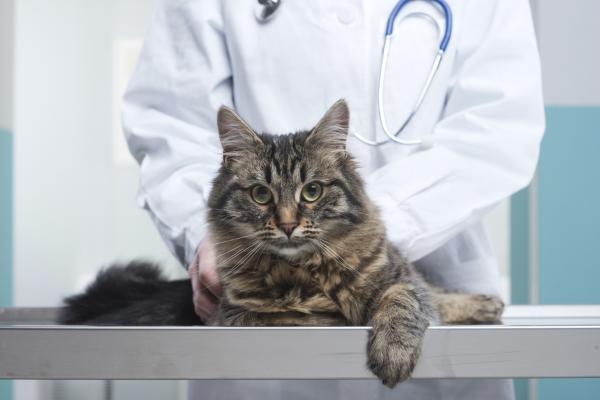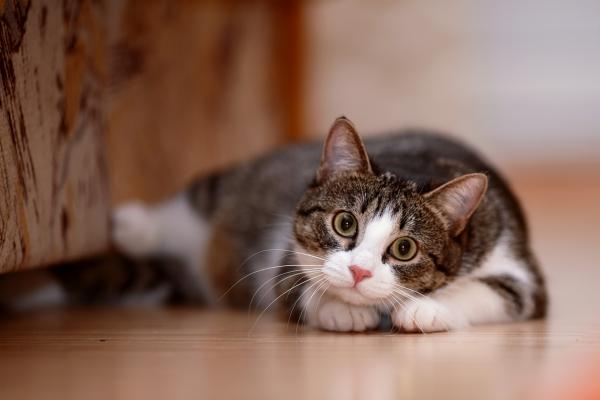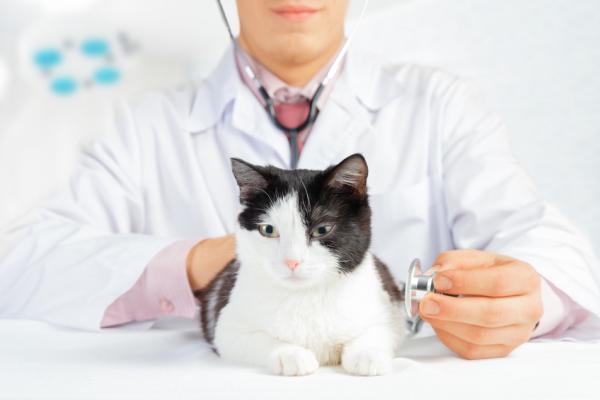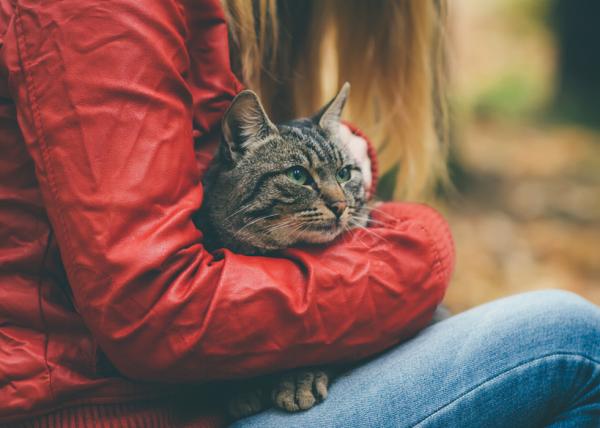Ascites in cats – Causes and treatment

If you share your life with a feline friend, you are sure to know what health problems you may have and what you can do about it. To offer a good quality of life you will have to spend time with him for many reasons, among which we can highlight the fact of knowing him well and, thus, be able to detect easily if he has had any physical or mental change that could alert us that maybe he is sick. For example, if you detect that your cat has the swollen belly, it may be ascites or abdominal effusion.
We’ve already talked about ascites in dogs, but if you have a cat and you want to know more about this condition that also affects domestic cats, keep reading this new article and know in detail the causes and treatment of ascites in cats.
What is ascitis?
Also called effusion or effusion abdominalIt is not a disease in itself but it is a clinical sign that alerts us that there is a main pathology that is causing it. This condition occurs when there is a abnormal accumulation of fluid in the abdomen, which can come from a spill by osmosis through the blood vessels, the lymphatic system or the different organs of this part of the body.
At the first symptoms we should go to the vet quickly because in severe cases the accumulation of fluid in the abdomen can cause breathing problems and, in addition, the underlying cause of the abdominal spill can be really serious and even cause the death of the animal.

Causes of ascites in cats
As we have already pointed out, abdominal effusion is a condition in which fluid accumulates in the abdomen, which is known as ascitic fluid, so the cat will have a swollen belly. This condition that occurs in the abdominal area can occur for a large number of different reasons and, for this reason, it is essential that a veterinarian do all the necessary tests to detect the origin of this clinical sign.
Some principales Causes of abdominal fluid in cats, that is to say that they provoke an edema or accumulation of abdominal fluid, are the following:
- Congestive heart failure on the right side
- Feline infectious peritonitis (PIF or FIV in English)
- Kidney disorders such as insufficiency, infection or stones
- Liver disorders, especially inflammation of this
- Disorders of blood circulation and coagulation
- Hypoproteinemia or decreased levels of protein in the blood
- Bleeding tumors or abdominal cancer, especially in the liver and bile
- Trauma with rupture of blood vessels and / or internal organs that causes abdominal bleeding
- Rupture of the urinary bladder

Symptoms of an abdominal spill in cats
Before talking about the treatment of ascites in cats, we should know this condition better. Thus, some more details to keep in mind about this disease are, for example, that as abdominal effusion may be caused by several reasons, in addition to those discussed below, some of the symptoms may be specific to each cause, which help in the differential diagnosis to know the true origin of the condition.
Between the Main symptoms of abdominal fluid in cats The following are found:
- Inflamed abdomen
- Lethargy and apathy
- Pain when moving and lying down
- Increased weight
- Loss of appetite
- Anorexia
- Vomiting
- Tenths of fever
- Groans and moans
- Pain and sensitivity to touch
- Muscular weakness
- Difficulty breathing
In advanced cases of this health problem swelling of the scrotum may occur in the males and of the vulva in the females. Furthermore, if part of the inflammation in the abdomen is observed in the chest, it can also be a pleural effusion, that is, an accumulation of fluid in the pleura around the lungs.
Diagnosis of abdominal effusion in cats
To diagnose the abdominal discharge the veterinarian must perform a physical exam complete and analyze ascitic fluid previously extracted and, thus, also find the cause. In addition, there is more evidence to be done to be sure not only that it is an abdominal spill and not something else, but also to ensure what is the reason for this. These others Tests for ascites in cats are:
- Abdominal ultrasound
- Abdominal x-ray
- Urine analysis
- Blood test
- Crops

Treatment of ascites in cats
The treatment of feline abdominal effusion depends completely on the disease or major problem that caused it. For example, if there is an infection, it should be treated with AntibioticsIf the cause is a trauma, it will be necessary to assess the possibility of surgery Immediate because of all the risk that the situation entails and, if there is a tumor, it will be necessary to consider an adequate treatment or surgery. But, in any of the cases for which there is an abdominal edema, the treatment to follow should be indicated by the specialist veterinarian.
Something that is always done to relieve the animal while it is treated is to proceed emptying of the ascitic fluid, not just a little to analyze it but as much as possible every few hours or days depending on the case. In addition, whether the cats suffering from this condition are hospitalized or at home, they should be given a low salt diet since it favors the retention of liquids and in this case we seek the opposite effect. For this reason, in certain cases in which the state of the kidneys allows it, the specialist can prescribe diuretics.
Prevention of abdominal effusion in felines
After knowing the causes and treatment of ascites in cats, and more details, sure you want to know how to prevent the swollen belly in your cat for this problem. But really, total prevention is not possible of this health problem, since there are many possible causes of this. So, we can only take some precautions that help us reduce the risk of this condition in our pet:
- Follow the vaccine schedule for cats
- Do not let your cat leave the house without control or vigilance on your part
- Watch the windows and balconies of the house to avoid falls
- Do not medicate your cat on your own, always consult with the veterinarian
- Feed your pet with some of the best feed

This article is merely informative, in .com we do not have the faculty to prescribe veterinary treatments or make any kind of diagnosis. We invite you to take your pet to the veterinarian in case of any type of condition or discomfort.
If you want to read more articles similar to Ascites in cats – Causes and treatment, we recommend that you enter in our section of Other health problems.


